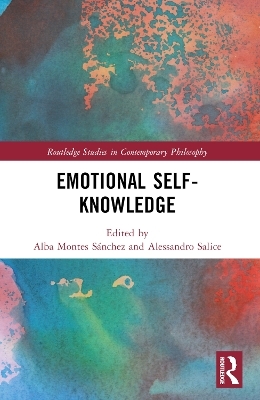
Emotional Self-Knowledge
Routledge (Verlag)
978-1-032-31711-3 (ISBN)
The relation between self-knowledge and human emotions is an often emphasized, but poorly articulated one. While philosophers of emotion tend to give affectivity a central role in making us who we are, the philosophical literature on self-knowledge focuses overwhelmingly on cognitive states and does not give a special place to the emotions. Currently there is little dialogue between both fields or with other philosophical traditions that have important contributions to make to this topic, such as phenomenology and Asian philosophy. This volume brings together philosophers from the relevant fields to explore two related sets of questions: First, do philosophers of emotion exaggerate the importance of our affective lives in making us who we are? Or is it philosophers of self-knowledge who misunderstand emotions? Second, what is the role of emotions in self-knowledge? What sort of self-knowledge can be secured by paying attention to our emotions?
Emotional Self-Knowledge is an essential resource for researchers and advanced students working on philosophy of emotion, philosophy of mind, epistemology, philosophical psychology, and phenomenology.
Chapter 1 and Chapter 10 of this book are freely available as a downloadable Open Access PDF at http://www.taylorfrancis.com under a Creative Commons Attribution-Non Commercial-No Derivatives (CC-BY-NC-ND) 4.0 license.
Alba Montes Sánchez is a Postdoctoral Researcher at the Center for Subjectivity Research in Copenhagen, Denmark. She has published widely on the phenomenology and moral psychology of self-conscious emotions like shame, pride, and envy, in journals like European Journal of Philosophy or Frontiers in Psychology and collective volumes in Routledge or Cambridge University Press. Alessandro Salice is a Lecturer at the Department of Philosophy of University College Cork, Ireland, and a Research Associate at the Center for Subjectivity Research in Copenhagen, Denmark. He has extensively published on a variety of topics mainly related to phenomenology, philosophical psychology, philosophy of action, social ontology, and moral psychology. His current work develops along two general directions: he continues to address various systematic issues concerning human sociality by also exploring the philosophical potential of phenomenology.
Introduction: Self-Knowledge and Emotion Alba Montes Sánchez and Alessandro Salice Part 1: Affectivity and Self-Knowledge 1. Affective Forecasting and Substantial Self-Knowledge Uku Tooming and Kengo Miyazono 2. Alienated Emotions and Self-Knowledge Krista K. Thomason 3. Acquiring Self-Knowledge from Others Edward Harcourt 4. Emotions and the Contestation of Social Identities Bennett W. Helm 5. Emotion, Self-Knowledge, and Liberation in Indian Philosophy Matt MacKenzie Part 2: The Emotions, Self-Knowledge and Self-Ignorance 6. Good Enough to Be Myself?: The Fraught Relationship Between Self-Esteem and Self-Knowledge Anna Bortolan 7. Three Stages of Love, Narrative, and Self-Understanding Pilar Lopez-Cantero 8. Transitional Boredom: On Boredom and Self-Knowledge Antonio Gómez Ramos 9. Envy, Racial Hatred, and Self-Deception Alessandro Salice and Alba Montes Sánchez 10. Hostile Affective States and Their Self-Deceptive Styles: Envy and Hate Íngrid Vendrell Ferran
| Erscheinungsdatum | 11.09.2024 |
|---|---|
| Reihe/Serie | Routledge Studies in Contemporary Philosophy |
| Verlagsort | London |
| Sprache | englisch |
| Maße | 152 x 229 mm |
| Gewicht | 444 g |
| Themenwelt | Geisteswissenschaften ► Philosophie ► Ethik |
| Geisteswissenschaften ► Philosophie ► Philosophie der Neuzeit | |
| Geisteswissenschaften ► Psychologie ► Allgemeine Psychologie | |
| ISBN-10 | 1-032-31711-6 / 1032317116 |
| ISBN-13 | 978-1-032-31711-3 / 9781032317113 |
| Zustand | Neuware |
| Informationen gemäß Produktsicherheitsverordnung (GPSR) | |
| Haben Sie eine Frage zum Produkt? |
aus dem Bereich


